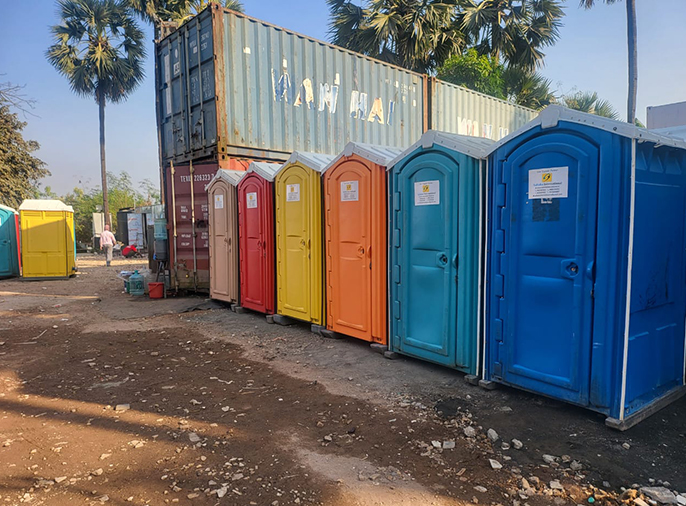
Portable toilets are essential sanitation solutions for various settings where permanent facilities aren't available or practical. Whether you're planning an outdoor event, managing a construction site, or organizing a festival, selecting the right portable toilets can significantly impact comfort, hygiene, and overall satisfaction. This guide covers all the essential information about portable toilets, enabling you to make well-informed decisions based on your specific needs and budget.From understanding the basics to evaluating key selection factors, we've got you covered with practical insights and valuable tips.
Portable toilets are independent sanitation units intended for temporary use in areas lacking conventional plumbing. They usually consist of a toilet seat placed over a holding tank filled with chemicals that help decompose waste and manage odors.Modern portable toilets come in various designs, from basic single units to more sophisticated cabin-style facilities with additional amenities
The standard portable toilet consists of a durable plastic enclosure, a non-flush toilet fixture, ventilation systems, and often includes toilet paper dispensers and hand sanitizers. More advanced models may offer handwashing stations, lighting, mirrors, coat hooks, and spacious interiors. These units are built to be easily transported, quickly installed, and regularly serviced, making them ideal temporary solutions for diverse settings.
Portable toilets serve numerous industries and occasions, including construction sites, outdoor weddings, music festivals, sporting events, disaster relief areas, and agricultural settings. Their versatility and practicality have made them an indispensable resource for situations where permanent bathroom facilities are unavailable or insufficient.
Portable toilets play a crucial role in maintaining public health and comfort in settings without permanent bathroom facilities. Their importance extends beyond mere convenience to address several fundamental needs:
Portable toilets provide controlled environments for waste management, helping prevent the spread of diseases and maintaining basic hygiene standards. Without these facilities, outdoor venues and work sites would face significant health hazards from improper waste disposal.
Many jurisdictions require adequate sanitation facilities at work sites and public events. Ensuring an adequate number of portable toilets allows organizers and businesses to meet health regulations and prevent the risk of fines or operational shutdowns..
On construction sites and in agricultural settings, accessible toilet facilities reduce time spent traveling to distant bathrooms. This directly translates to increased productivity and efficiency among workers.
For events and public gatherings, adequate toilet facilities significantly impact attendee satisfaction and the overall experience. Insufficient or poorly maintained facilities often become the most remembered negative aspect of otherwise well-planned occasions.
Proper waste containment through portable toilets helps protect local ecosystems from contamination. This is particularly important near water sources, parks, and protected natural areas.
Modern portable toilet options include accessible units for people with disabilities, ensuring everyone has access to necessary facilities regardless of their mobility challenges.
Portable toilets offer a practical and efficient sanitation solution in places where traditional restrooms are not available. Below are the key benefits of using portable toilets:
Portable toilets are designed for quick transportation and installation. They can be placed at any location without the need for plumbing or construction, making them ideal for temporary setups like events or construction sites.
Portable toilets offer a cost-effective and time-saving alternative to constructing permanent restrooms. They reduce infrastructure costs and require minimal maintenance, making them a budget-friendly option for short-term or mobile use
Modern portable toilets come equipped with hand sanitizers, ventilation, and proper waste disposal systems. These features help maintain hygiene standards and provide a clean environment for users.
Many portable toilets operate with low-water or waterless systems and utilize environmentally friendly waste treatment methods. This helps conserve water and supports responsible waste management practices in outdoor or remote locations.
Portable toilets offer a private space with secure doors and ventilation. Some models also include lighting, flush systems, and handwashing stations, ensuring a comfortable experience for users.
They can be used in a wide range of places such as weddings, festivals, construction sites, remote areas, disaster relief zones, and more anywhere a fixed restroom isn’t available.
Yes, modern portable toilets are designed with hygiene in mind. Many come equipped with ventilation, hand sanitizer dispensers, flush systems, and regular cleaning services to maintain cleanliness.
Cleaning frequency depends on usage, but for high-traffic areas, daily or every few days is recommended. Service providers usually offer scheduled cleaning and waste removal.
A general rule is one toilet per 50 people for events lasting up to 4 hours. For longer events or higher attendance, more units are needed. It's best to consult a rental provider for accurate planning.
Yes, they are weather-resistant and can be used year-round. Some models come with insulation and heating options for colder climates.
Portable toilets have become an essential solution for temporary and mobile sanitation needs across various industries and events. Whether it's a construction site, a wedding function, a public gathering, or a remote work location, portable toilets provide an efficient and accessible alternative to traditional restrooms. Their mobility allows them to be placed almost anywhere, and their quick setup saves both time and resources.
Beyond just convenience, modern portable toilets are designed with hygiene, comfort, and the environment in mind. From hand sanitizers and proper ventilation to water-saving systems and eco-friendly waste disposal methods, these units meet the growing demand for sustainable solutions.
Moreover, they help businesses and event organizers comply with health and safety regulations, ensuring the well-being of workers, guests, or the general public. With various models available ranging from basic units to luxury cabins with advanced features portable toilets can be tailored to suit different needs and budgets.